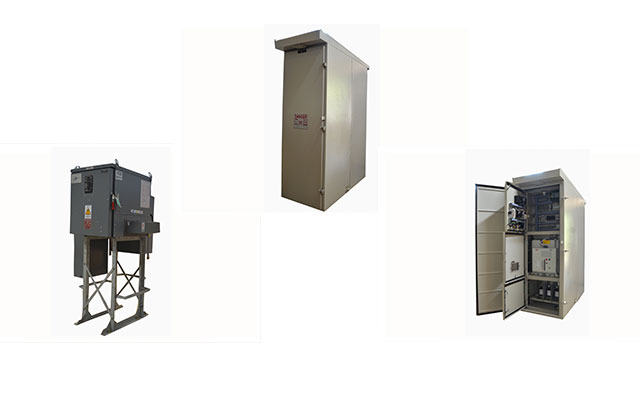Ring Main Unit (RMU)

Manufacturer and Suppliers of Ring Main Unit in ahmedabad, gujarat, india
Components of RMU
- Load Break Switch (LBS) : Used for switching operations under load conditions.
- Circuit Breaker (CB) or Fuse : For fault protection—either vacuum circuit breaker (VCB) or fuses.
- Earth Switch : Safely grounds the system during maintenance.
- Busbars and Cable Compartments : For incoming, outgoing, and interconnecting power flow.
- Protection Relays : For overcurrent, short-circuit, and earth fault protection.
Types of Ring Main Unit
- Gas Insulated : Compact and maintenance-free, widely used.
- Air Insulated : Bulkier, less costly.
- Solid Dielectric Insulated : Eco-friendly alternative to SF6.
Advantages of RMU
- Compact size – suitable for space-constrained areas.
- High reliability and safety.
- Minimal maintenance (especially with SF₆ or solid insulation).
- Quick fault isolation and service restoration.
- Remote control and automation capabilities.
Applications
- Urban and industrial power distribution.
- Ring or radial feeder networks
- Compact Substations
- Renewable energy grids and smart grid infrastructure.
Top Quality Ring Main Unit (RMU) In Ahmedabad, Gujarat, India.
Ring Main Unit (RMU) is a pivotal element in the architecture of electrical distribution systems, serving to bolster both the reliability and efficiency of power supply networks. At its core, an RMU is composed of a series of interconnected switchgear, which are essential for the effective distribution of electricity to various feeders. This interconnected system not only allows for the seamless flow of electrical power but also incorporates advanced protection and control mechanisms. These features are critical in safeguarding the network against faults and ensuring that the electricity supply remains stable and uninterrupted.
One of the key advantages of an RMU is its ability to facilitate the management of electrical loads. By enabling operators to monitor and control the distribution of power, the RMU helps to optimize the performance of the electrical network. This capability is particularly important in urban settings, where demand for electricity can fluctuate significantly due to varying consumption patterns. Furthermore, the design of the RMU allows for maintenance activities to be conducted safely and efficiently. Technicians can perform necessary upkeep without the need to disrupt the overall power supply, thereby minimizing downtime and enhancing service reliability for end-users.
The compact design and modular nature of RMUs make them especially well-suited for installation in urban environments, where space is often at a premium. Their small footprint allows for easy integration into existing infrastructure, making them an ideal choice for modern electrical systems that require both functionality and efficiency. As cities continue to grow and evolve, the role of RMUs in electrical distribution becomes increasingly vital. They not only support the current demands of urban power consumption but also lay the groundwork for future advancements in smart grid technology and renewable energy integration. In summary, the RMU is an indispensable component of contemporary electrical infrastructure, ensuring that power distribution remains reliable, efficient, and adaptable to the changing needs of urban populations.


